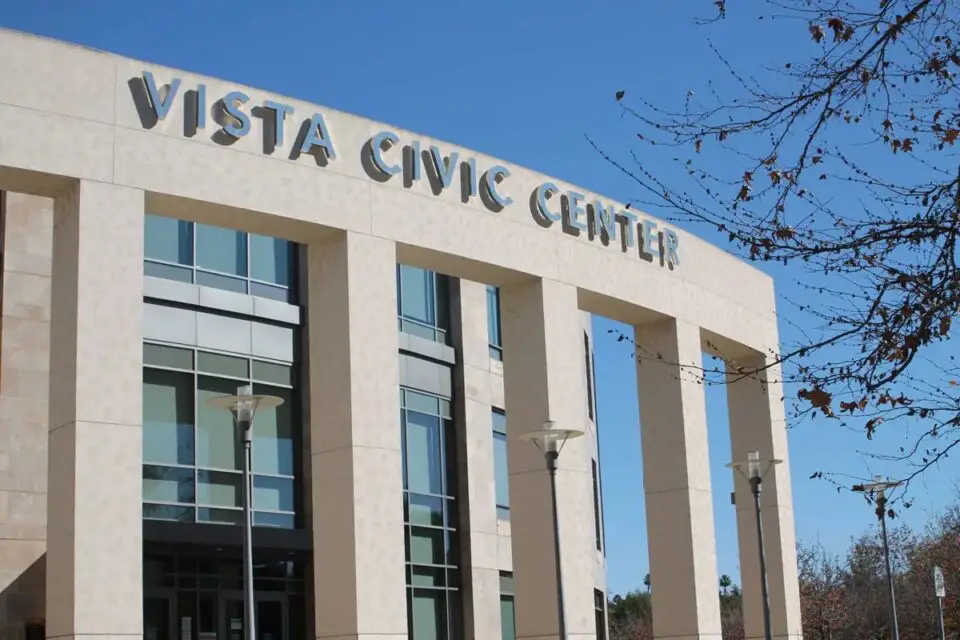VISTA — The Vista City Council has expressed interest in establishing new restrictions regarding homelessness encampments to prohibit individuals from setting up camp within certain distances of property, including schools, playgrounds and public waterways.
Vista Mayor John Franklin brought forward the discussion at the council’s April 23 meeting, stating that children and families need to be protected from individuals showing severe signs of drug addiction and mental illness at schools and on public property such as parks.
Franklin also argued that law enforcement needs additional tools to deal with “shelter-resistant” individuals who may not recognize that they need help.
As part of the discussion, the council reviewed the terms of the encampment ban implemented by the city of San Diego. The ban prohibits camping on public sidewalks and other areas regardless of whether shelter space is available and issues citations for violators.
Franklin emphasized that he is not interested in citing individuals if shelters are full, nor is it productive for homeless residents to rack up citations they cannot pay. Instead, he said the city attorney’s office should offer violators a diversionary route to a fine or jail time where they can instead obtain mental health and substance use treatment.
“Living outside when shelter is available and offered is evidence of mental illness and disorder,” Franklin said. “We could offer a diversionary agreement to an individual living unsheltered, who we have offered shelter to and they have declined, where we ask those people to participate in a rehabilitation or mental health program as a diversion to prosecution.”
After a lengthy and, at times, emotionally charged discussion, the City Council voted 4-1, with Corinna Contreras dissenting, to direct staff to begin drafting an ordinance and bring back the debate once the U.S. Supreme Court issues a decision in a case regarding encampment bans in Grants Pass, Oregon.
The Grants Pass case centers on whether cities should be able to fine or jail individuals for sleeping on public land when there is not adequate shelter space available. Franklin said he didn’t believe the Supreme Court decision would have a large bearing on a proposed local policy since the city is not proposing to cite individuals if shelter is available.
Other council members said they preferred to wait for the outcome of the Grants Pass decision — expected at the end of June — just to be safe and research the specifics of the proposed restrictions.
Council members who supported the motion said they generally supported banning encampments within two blocks of schools and shelters and a certain distance from playgrounds.
The proposed restrictions and many of Franklin’s comments elicited concern from individuals who said they would further criminalize homelessness and be ineffective in actually helping people become housed. Several individuals from the San Diego County organization Lived Experience Advisers spoke about their experiences with homelessness and the need for compassion.
Rachel Hayes said she was homeless in San Diego for 10 years before recently being connected to permanent supportive housing. While out on the street, she said she was in “24/7 survival mode” due to the trauma and having to be aware of her surroundings constantly.
“If you are a human being, you have to be somewhere,” Hayes said. “I saw the start of the encampment ban, and it was cruel and unusual punishment. It destroyed my community … An encampment ban is just a way to harass and criminalize the homeless.”
Natalie Rashki, who said she previously lived out of her car with her four children and husband in San Diego County, challenged Franklin’s assertions that the city should focus on those who say yes to shelter. She said there are many reasons why women and families choose not to go into shelter spaces.
“Just because we become homeless doesn’t mean we take whatever you have to offer. There’s a lot of factors that go into trauma and dignity,” Rashki said.
Others noted that even though the city’s new low-barrier Buena Creek Navigation Center, which opened in March, is better than many other shelter options, it can only house so many people.
Capt. John Boyce of the Vista Sheriff’s Station said deputies are focused on providing resources to unhoused individuals. Boyce said citation and arrest are a last resort for individuals who refuse services, refuse to leave a restricted area or pose a safety threat.
“We are not going to arrest ourselves out of this unhoused issue,” Boyce told the council.
Councilmember Joe Green said the definition of “encampment” needs to be clarified, asking whether it includes anyone laying down or setting up a blanket in a park. He said he would not favor banning camping in public parks during the day.
“I don’t want to 86 an entire park because there’s a lot of green space and there’s a lot of trails,” Green said.
Deputy Mayor Katie Melendez agreed.
“I have lots of concerns about punishing people sleeping in the parks. I would hate to enforce something that is not for safety, and just appears to be for safety, but is actually restricting the freedom of our community,” she said.
Melendez also mentioned the possibility of establishing a safe camping site, similar to what is offered in San Diego, where residents can go while awaiting space in a shelter.
Franklin lambasted this suggestion, saying it would establish an equivalent of Skid Row in Vista.
Contreras shared concerns that a two-block radius banning encampments near schools would infringe upon private property rights, stating that some individuals may allow safe camping areas on their private property.
“I would rather us speak with certainty when we look at the possibility of somebody’s private property being encroached,” Contreras said. “I’m really not interested in playing Supreme Court up here. I don’t want to rush into something that we have zero clarity on. It’s becoming more and more concerning to me.”
After discussing the encampment ban, the council voted 3-1-1 to table Franklin’s proposed policy statement on homelessness. Franklin opposed postponing his statement, and Melendez abstained.
The statement emphasized that the city prioritizes homeless individuals in Vista to receive services before residents of other cities and stated that a housing-first approach is ineffective and removes funding from sober shelter facilities.
Franklin said the policy also recognized that addiction is a major driver of chronic homelessness.
The language in the policy also drew concerns from residents, stating that it stigmatized homelessness and those who have substance use disorders. Some objected to the use of the word “transient.”
“The proposed policy statement fundamentally misunderstands the nature of both homelessness and addiction,” said Michael Bronner, president of Vista-based national soap company Dr. Bronner’s.
Green said a policy statement like this required more discussion than was possible at the council meeting and wanted to see the city’s ad hoc homelessness committee discuss it.




